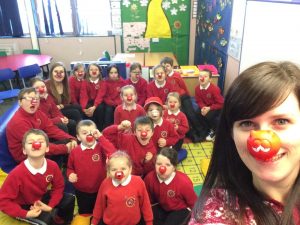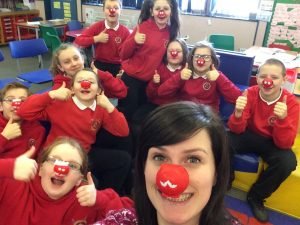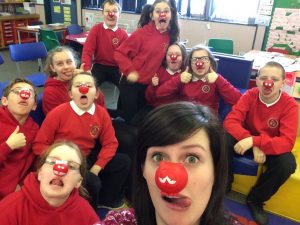On Monday primary 4-7 undertook various experiments about ‘changes’ as this is our topic this term. Here are some of our experiments:
We have placed a white flower into water, with food colouring added in, to see if this changes the colour of the petals. Flowers absorb water through the xylem, which is a tissue of thin tubes found inside the stem. Water is transported to the various parts of the plant including the flower. Because the water is coloured the petals should then take on the colour.
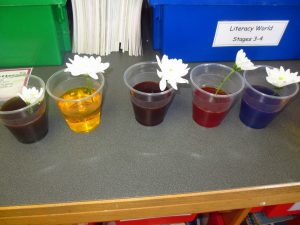
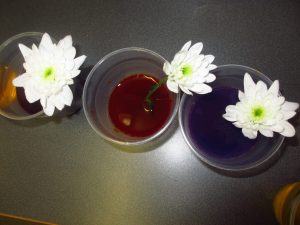
It has been 2 days and the flower in the green water has begun to turn green but there isn’t much change with the other flowers yet. Some of us thought the flower would change within: 5 minutes, 20 minutes, 1 hour or 1 day but we were all wrong with our hypothesis.
We split the stem of a rose into 3 and placed each of these in a different colour, red, blue and yellow, to see if this will give us a rainbow rose.
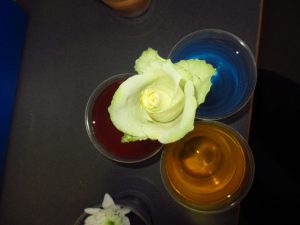

This hasn’t really changed yet but we know with the other flowers that it could take a while.
We placed eggs into different liquids to see if/how this changes the egg. We have one in water as a control, one is in coke, another in vinegar and the last in fresh orange juice. We discussed our hypothesis on what we thought would happen to each egg:
- The water wouldn’t change the egg
- The coke would dissolve the shell and make it bounce
- The orange juice wouldn’t do anything
- Some thought the vinegar would dissolve the shell and make it bouncy
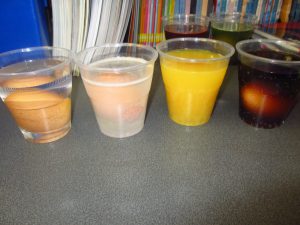
As soon as we put the egg in the vinegar it started to react by producing lots of bubbles, this is because the calcium carbonate in the shell is dissolved by the acetic acid producing carbon dioxide.
We checked the eggs after 1 day and there were slight changes:
- The water had cracked the egg and it began to seep out
- The coke hadn’t dissolved very little
- The orange juice had dissolved quite a lot which was surprising
- The vinegar had dissolved lots and made the egg squishy and bouncy
We checked the eggs again today and it was very interesting:
- The water hadn’t changed from the day before, it was still split but nothing more has come out
- The coke had dissolved very little but had stained the egg further
- The orange juice dissolved the shell a little more
- The vinegar had made the egg even bigger and bouncier

Below are close ups of the control, orange juice and coke
As you can see the egg in the vinegar is much bigger than the control egg in the water. This is because the membrane around the egg is semi permeable. Whilst it was in the vinegar the liquid moved through the membrane into the egg resulting in the membrane swelling and increasing in size.

We tested how well the vinegar egg could bounce. It bounced from 10cm high so we went up to 20cm and it still bounced so we tried dropping it from 30cm…it didn’t bounce though.
We poured milk into a glass and added red bull. When we discussed what we thought would happen there were a few different thoughts:
- it would curdle
- it would separate
- it would sink to the bottom

You can just about see from the photo there is a layer at the top of the glass. After 5 minutes of pouring in the red bull the acid in the Red Bull causes the protein in the milk to separate. When the milk curdles, a chemical reaction takes place resulting in a precipitate.
We did one more experiment with milk. We placed enough milk on a plate to cover the bottom. Then we poured drops of food colouring into the milk but nothing happened. We then took a cocktail stick and placed one end in fairy liquid before placing this into the milk and food colouring. What happened next was really cool.
The colours began to spread away from the fairy liquid and began mixing together. This is because fat and protein molecules in the milk are altered by the soap. These fat and proteins are super sensitive to change in the milk so when the fairy liquid is added it creates a chemical reaction and causes them to roll around. Once the soap molecules have mixed evenly with the fat and protein molecules the motion stops so we added more fairy liquid to keep the action moving. The food colouring helps us to see this change.










